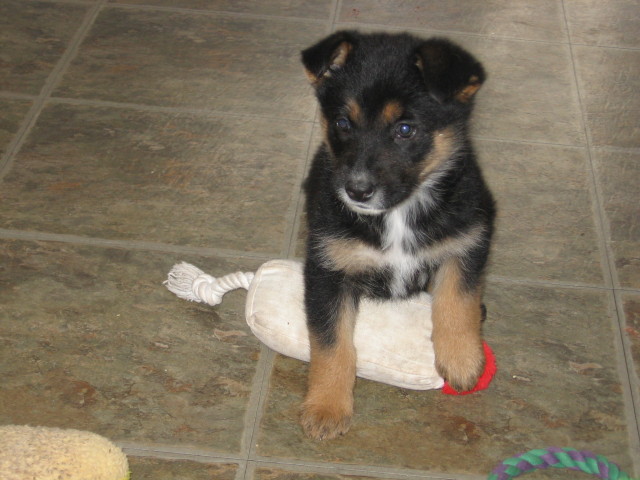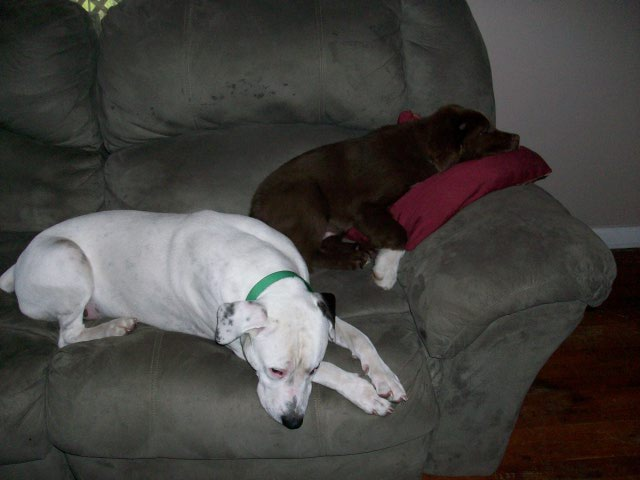QuestionA month ago I adopted a male chihuahua who was rescued from a puppy mill. My vet thinks he is 8-10 years old. His body speaks to how terrible his conditions must have been: mangled feet, toothless, partial ear, swollen knees, muscle atrophy in his hind legs. In spite of his physical issues, he is a very loving and trusting dog. My questions has to do with barking. The first week I had him he was absolutely quiet. Then as a friend says, "he found his voice." He began to bark at people who come to visit. He will stop if someone holds him, even the visitor, but as long as he is not being held and the visitor is there, he will bark continuously. Also, when he is out in the yard after about 10 minutes or so he will walk around the yard barking at nothing inparticular. How can I begin to work at reducing my little guy's barking?
AnswerCongratulations on being a humanitarian and giving this little guy a shot at a loving home!
Your dog may be suffering from a cognitive dysfunction caused by his neglect; this might be neurological but it also may be the result of impaired vision (something only a veterinary ophthalmologist can tell you.) Constant exposure to urine and feces (which produce gases) at the bottom of a filthy cage for so long a time might definitely have impacted his vision. Dogs are normally "nearsighted" (their vision being far less acute than our own although their night time vision is more acute.) He is also severely insecure, despite your marvelous rehabilitative work, and perhaps so much so that he cannot cognitively define his environs with a great deal of stimulus surrounding him (such as occurs when visitors are in your home or when he is outdoors.)
It appears that you may not have had this dog for very long; it will take him many MONTHS to habituate to a normal household. The outdoors may be far more than he can deal with by himself; try putting him on very long, very lightweight outdoor leash. When he begins to vocalize outdoors, use the leash to gently guide him toward you, then ask him for a simple behavior ("sit", you can teach him this quite easily using positive reinforcement training). This will engage him, reassure him that you are present, give him a moment to redirect his attention and energy, after which you can then let him back out to wander around for a while (with you in attendance) should you choose to do so. This small dog does not need time outdoors ALONE; he's spent sufficient time in his life ALONE. He needs the safety and security of your presence and your home. Think of this like swaddling a human infant: surrounding anxiety with safe confinement can be soothing.
Regarding his barking at your visitors, it's wonderful that he allows total strangers to pick up and hold him! It's amazing how forgiving this species is! Instead of immediately rewarding his barking by allowing someone to pick him up, have that person ask him for the "sit" and reward that behavior, THEN pick the dog up. If the dog is picked up BECAUSE he is barking, you are training the barking; if he is asked to perform a behavior first, then he is EARNING the affection and attention. As he begins to learn that he must EARN being held, he will cease demanding it (by barking). Give him lots of time to adjust to this new life.

 Post bladder surgery potty training for INDOORS!
QuestionTiki
QUESTION: Dear Dr. Connor,
My 10 ye
Post bladder surgery potty training for INDOORS!
QuestionTiki
QUESTION: Dear Dr. Connor,
My 10 ye
 puppy problems
QuestionQUESTION: I am the proud owner of 2 german shep
puppy problems
QuestionQUESTION: I am the proud owner of 2 german shep
 Dog in Heat?
QuestionLily and Jorge
QUESTION: Hello,
We have
Dog in Heat?
QuestionLily and Jorge
QUESTION: Hello,
We have
 American Bulldog aggression
Question
Buddy and Rez
I have a 2 year old Ameri
American Bulldog aggression
Question
Buddy and Rez
I have a 2 year old Ameri
 Nightmares?
Question
Beethoven
Hi Melissa, Ive had my very h
Nightmares?
Question
Beethoven
Hi Melissa, Ive had my very h